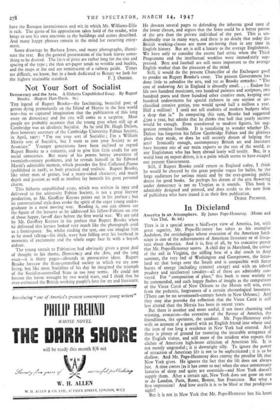Not Your Sort of Socialist
Democracy and the Arts. A Hitherto Unpublished Essay. By Rupert Brooke. (Rupert Hart-Davis. 6s.) THE legend of Rupert Brooke—the fascinating, beautiful poet of genius dying prematurely on the Island of Skyros in the first world war—has so captured imagination that the publication of this long essay on democracy and the arts will come as a surprise. Most people are probably unaware that the young poet when still up at Cambridge was an idealistic Socialist. As he told Dr. Hugh Dalton, then honorary secretary of the Cambridge University Fabian Society, in April, 1907: "I'm not your sort of Socialist ; I'm a William Morris sort of Socialist, but I want to join your Society as an Associate." Younger generations have been inclined to regard Rupert Brooke as a romantic, and to give him little credit for any social conscience. But many of his poems betray awareness of twentieth-century problems, and he reveals himself in Sir Edward Marsh's admirable memoir, which precedes the first Collected Poems (published in 1918), as both practical and realistic. Rupert Brooke, like other men of genius, had a many-sided character, and much depth and passion as well as intellect lay beneath his great personal charm.
This hitherto unpublished essay, which was written in 1910 and delivered to the university Fabian Society, is not a great literary production, as Mr. Geoffrey Keynes points out in his preface ; but its conversational style does evoke the spirit of the eager young under- graduate in a most moving way. Reading it, one can almost see the figure of the lecturer as he addressed his fellow-Fabians on one of those happy, far-off days before the first world war. We are told by Mr. Geoffrey Keynes in his preface that Rupert Brooke when he delivered this lecture looked very much like the photograph used as a frontispiece. So, whilst reading the text, one can imagine him as he stood talking—his thick, wavy hair falling over his forehead in moments of excitement and the whole eager face lit with a boyish ardour.
The young recruit to Fabianism had obviously given a great deal of thought to his theme, Democracy and the Arts, and the long essay—it is thirty pages—abounds in provocative ideas. Rupert Brooke foresaw the State-controlled society in which we are now living, but like most Socialists of his day he imagined the triumph of the Socialist-controlled State in too rosy terms. He could not foresee the havoc wrought by two world wars, and I think that he over-estimated the British working people's love for art and literature.
He devotes several pages to defending the inherent good taste of the lower classes, and argues that the State could be a better patron
of the arts than the private individual of the past. This is un-
doubtedly true in many ways, and there is no doubt that today the British working-classes are more art-loving than in any time in English history. But art is still a luxury to the average Englishman. We have only to consider the recent fuel crisis when the Third Programme and the intellectual weeklies were immediately sup- pressed. Beer and football are still more important to the average English worker than the pleasures of the mind.
Still, it would do the present Chancellor of the Exchequer good to ponder on Rupert Brooke's essay. The present Government has done little to subsidise the arts, and yet as Brooke remarks: "The cost of endowing Art in England is absurdly small. .. . Endow for life two hundred musicians, two hundred painters and sculptors, two hundred poets and three hundred other creative men, keeping one hundred endowments for special richness in one section or un- classified creative genius, you would spend half a million a year. Half a million! I need not tell students of modern budgets what a drop that is." In computing this sum, Brooke had suggested L500 a year, but admits that he thinks that half that yearly income would be enough. Even transferred to modern figures, his sug- gestion remains feasible. It is tantalising to wonder whether Dr. Dalton has forgotten his fellow Cambridge Fabian and the glorious. plans they made, or does he still secretly dream of helping the arts? Ironically enough, contemporary British art and literature have become one of our main exports to the rest of the world, as any Englishman who has been abroad lately will testify. But, in a world bent on export drives, it is a point which seems to have escaped our present Government.
Still, if Rupert Brooke could return to England today, I think he would be cheered by the great popular vogue for ballet, by the large audiences for serious music and by the ever-growing public desire for good books. So perhaps his dream of the arts flowering under democracy is not so Utopian as it sounds. This book is admirably designed and printed, and does credit to the new firm of publishers who have issued it as their first publicatian.
DEREK PATMORE.


































 Previous page
Previous page